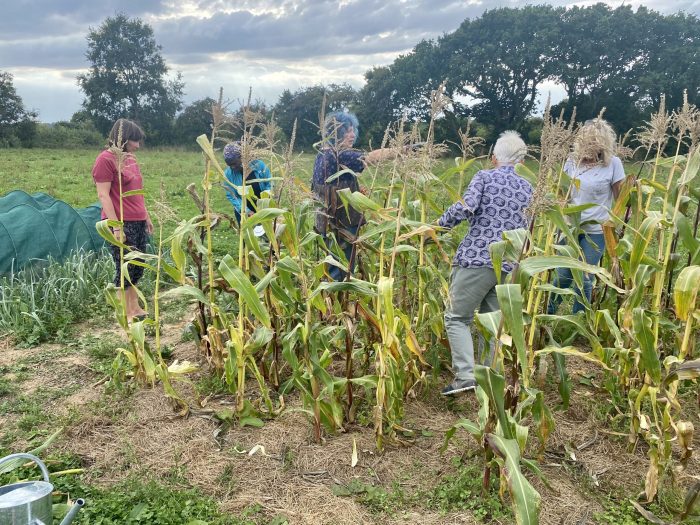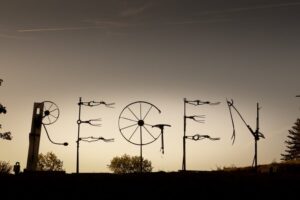
The recently announced Lieutenant-Governor of Jersey’s Agriculture and Horticulture Bursaries: could this herald a regeneration for the Island’s farming industry? By Alasdair Crosby
Let’s start by talking about the weather – after all, we are British.
The weather recently has been quite vile at times – as readers may have noticed – and supermarket shelves have had some surprising blank spaces where everyday, mundane products should have been stacked up.
It is, of course, not a new phenomenon that in bad weather shipping can’t reach us – but somehow in recent years those gaps along shelves have become more common and regular and not just the result of one stormy winter. At different times it could be a sudden mustard famine, or mixer drinks, or tomato ketchup, or Greek yoghurt… as shoppers these days, increasingly we need to ‘mind the gaps’.
In addition to minding the gaps, we have had to mind our expenses for food, as prices rise and then rise again.
Anyone struggling to provide food for themselves and their families at the moment is not going to thank me for suggesting that the cost of food has become too low in recent decades; we have become spoiled and a rise now is an overdue corrective that should have been long expected.
An answer to at least to some of these problems is to grow or produce more of what we can in the Island, for our own benefit. Of course, it is bonkers to suggest that Jersey could produce its own coffee or bananas: self-sufficiency is impossible. But what is possible is to have a greater degree of self-reliance and to grow or to produce things that are possible to produce locally, as part of a circular rural economy.
Or think of it like house insurance: we all have it, and pay for it, but we sincerely hope we don’t have to make a claim. It is comforting to know, however, that, if the unexpected or the horrible were ever to happen, we would have some protection and recompense.
A local farming industry that produces local food for local people is a similar insurance. At the moment, we are dangerously under-insured and all the time our level of insurance protection is getting worse. Since Woodside Farms stopped growing vegetables for the local market last year, far too much produce has had to be imported to take its place. If Jersey were a building, an inspector assessing the insurance risk would have a fit.
‘Food security’ used to be a ridiculous if not slightly comical concept, in Jersey as elsewhere. If a personal recollection might be permitted, some 30 years ago I asked some of the Great and the Good in the Island about threats to food security, and I was told, metaphorically, not to worry my dear little head about things that would never happen. ‘Do you think Germany will invade us again? Ho Ho!’
These days, the merriment has subsided.
We have all felt the economic impact of those ugly sisters: Brexit, Covid, the war in Ukraine, climate change… Only very recently India has stopped its exports of rice. We all know about what is happening to grain exports from Ukraine. France, in fact, has recently renamed its Ministry of Agriculture as the Ministry of Agriculture and Food Sovereignty. The virtues of localism, local food production and the circular economy are being promoted far and wide.
Trouble is, for local food production, self-evidently one needs local farmers to ensure continuity of supply and to increase, as it were, our Island home insurance cover to an adequate level.
What can we do to encourage local food production and local farming? For decades we have neglected the farming industry. In very recent times, the concept of ‘regenerative farming’ has become quite familiar, in terms of regenerating the soil. Now, in addition, we also need to regenerate farming and farmers.
Thank goodness, that regeneration has begun to happen.
§
In April, the Lieutenant Governor, Vice Admiral Jerry Kyd, held a reception at Government House for members of the Jersey farming community – it is believed to have been the first time that such a meeting has happened. Needless to say, it went down very well with the guests who perceived – rightly – that the problems of farmers were on government’s radar and that the Crown was eager and anxious to help where and when it could.
There is, of course, an element of enlightened self-interest on the part of the Crown: some 575 vergées of Crown land in the Island is occupied by tenant farmers, and of course the Crown would far prefer to have tenants who were capable of having commercially viable businesses that allowed them to afford to pay rent. Nevertheless, King Charles is surely a farmer and a countryman at heart: there have been countless instances in which he has demonstrated his concern and support for British farmers and British farm produce. Late last year, at the time of the tragic death of more than 100 cows kept at Woodlands Farm, most likely from botulism, The King returned seven heifers that had been presented to the late Queen for her Platinum Jubilee, so as to help the Farm rebuild its herd.
In short, the help for and interest in Jersey agriculture comes not just impersonally from ‘The Crown’ but also from a personal, supportive, royal origin.
This interest and help is also very much aligned with the current thinking of Jersey’s government. This year, the industry has been the recipient of an extra £1.5m government aid, bringing the total of ‘new money’ to agriculture in the past year to about £3.3m and equivalent to a 400% increase in funding in five years.
As the Deputy Chief Minister and Minister for Economic Development, Deputy Kirsten Morel, said at the beginning of 2023: ‘That is really good and shows finally that we have a government that understands the importance of farming.’
The bursaries for agriculture and horticulture that the Receiver General announced last week is yet another instance of a desire to regenerate farming in the Island. As stated, ‘The bursaries are available to any Jersey resident who is seeking to study these subjects. The support would be for any learning programme which could range from a four-year degree to a shorter-term training scheme. Up to 100% funding for fees and living expenses is available.’
So, they would be equally valid for students wanting to embark on a lengthy course at a UK agriculture college as for a short course in the Island; it could be for young people of student age or also for anyone who wants a bit of local training before starting up a smallholding.
There is no set sum or limited amount of money available: the bursary providers are waiting to see what interest there is in the scheme. Within hours of the announcement of these bursaries being available, already the first applicants were in contact with Government House – there is evidently a lively interest.
§
These bursaries are not the only initiative to regenerate farming in the Island. Also last week came the news that Masterfarms, the family-owned farming business, was encouraging Islanders from non-farming backgrounds to enter the industry with a new ‘earn while you learn’ scheme, for paid apprentices to be trained up – possibly from scratch – across different areas of their agricultural activity.
The Royal Jersey Society (RJA&HS) is working in collaboration with the Howard Davis Farm Trust and the Jersey Farmers Union on a new initiative to educate young people in modern agriculture and horticulture as a possible career option and to point out exciting opportunities that are available locally. The detailed report of the society’s ‘Cultivate’ programme is due to be released soon.
Also worth mentioning is the conference for those interested in smallholding that is due to take place soon, with the support of SCOOP Sustainable Cooperative and the Department of Economic Development.
In short, there is much that is positive going on to counterbalance, to some extent, the many sad trends and events that have been all too common in farming and in local food production.
§
All of this leads to the question: what could the future of agriculture in the Island look like?
There are still on-going, deep-seated problems relating to the future of farming. To mention but three: land use, succession planning – and, of course ‘resilience’.
It is necessary and desirable to maintain a viable land bank for the agricultural industry and to resist the temptation to cover everything with concrete, or at least, with building development. Yes, we need affordable housing, but we also need food. The ‘suburbanisation’ of the countryside is also to be avoided: extending gardens under the pretence that they are commercial apple orchards or turning too many fields into horse pasture.
It has often been suggested that we could grow considerably less potatoes for export and instead allow surplus potato fields to become fields for growing local produce for local people. This idea has legs: anyone on a country walk can see that there has been far less land being used for potato cultivation this year. The positive side of this is that it allows for less intensive cultivation of the crop and greater opportunity for crop rotation.
The Jersey Royal still has a market in the UK and it has stood up well to competition from other potato crops this year – better than in some past years. Its underlying problem is the societal turn away from eating potatoes and the decline of the ‘meat and two veg’ family meal.
Potatoes and the Island’s dairy produce will continue to be the two major sectors of agriculture, just as they have been for the past couple of centuries. However, the extra land now available could provide a great opportunity for smallholders. There are certainly many Islanders – perhaps youthful ones in the main – who would like to ‘have a go’ at farming. They think of enjoying ‘the good life’, of smallholding, of organic production, or of alternative crops that would give them a Unique Selling Point opportunity in the local market.
There is much to commend in all this; smallholding is certainly part of the answer, especially if a hub can be developed to allow for effective collaboration and distribution of produce to retail outlets.
One vision of a possible future is for some big commercial farming operations to evolve into smaller units – think ‘back to the future’. Their commercial viability would be improved by having less need to employ foreign workers.
Succession is also a problem, considering the impossibility of young would-be farmers ever being able to set up in business unless they can use inherited land. However, there are ways around this, being discussed at the moment, to provide access to land and to capital – such as various States and private partnership arrangements, or an evolution of the old ‘States Agricultural Loan’ scheme.
A further strand is the centuries’ old role of farmers as the custodians of the countryside and of the countryside’s amenity and visual aspect – in other words, its rural character – that gladdens the eye of locals and visitors alike. Without farmers and farming, the Island would look worse by far.
§
As consumers, by making the choice to buy local, we are all part of the Island’s farming economy and we can all help to shape its farming future, along with the bursaries and educational and training initiatives. With food prices continuing to rise, anything we can do to make our Island’s food security more resilient has got to be a good thing.
As the American farmer-philosopher Wendell Berry has written: ‘Eating is an agricultural act’.
And, as noted above, with a tendency, in these darkening times, towards less international movement and trade in food commodities, is it perhaps valuable to think about this exam question: ‘Is this the start of a new protectionism? Are we in the twilight of the era of free trade? Discuss.’
Or better still, learn how to grow or produce more food domestically – the training options are coming into place.

- E-mail hmreceivergeneral@gov.je for further information about the Lieutenant-Governor’s bursaries
This first appeared in the Jersey Evening Post of Saturday 19 August and is reproduced by their kind permission





One Response
I say ‘about time too’!
We need our agriculture & we need our fields, our trees & farmers too…desperately.